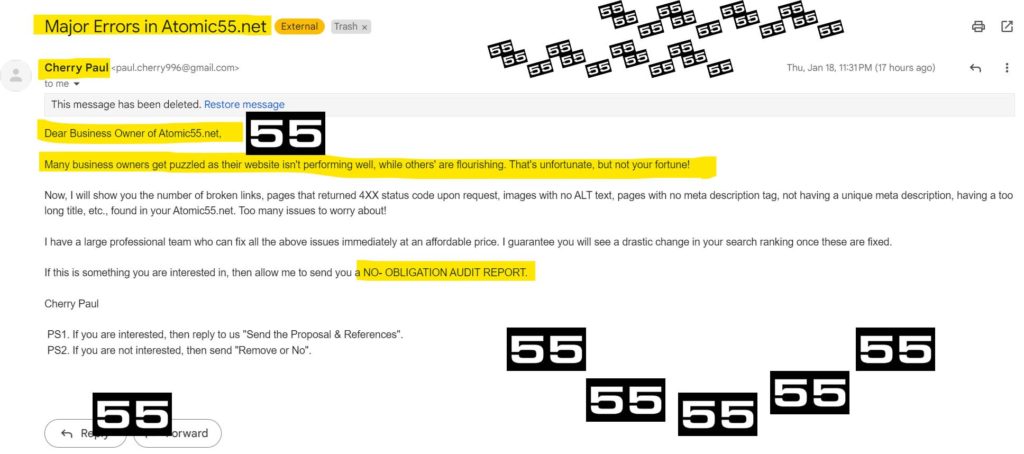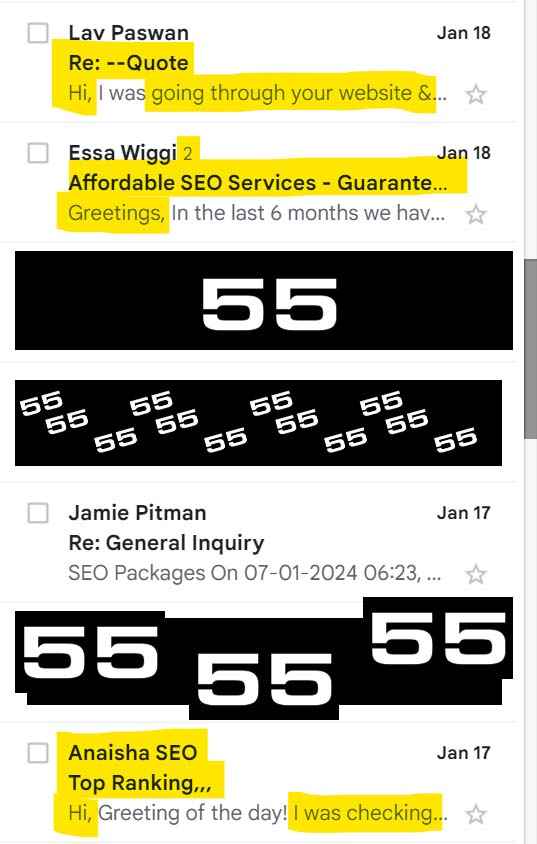
A while back we wrote about the pain caused by Copyright Trolls. In that article, we briefly touched on another annoying group of spammers that can cause you grief. These are spammers of the SEO variety. Considerably more harmless than the Copyright Trolls but far more intrusive, especially where your inbox is concerned.
Were you looking for information on Copyright Trolls? Read more on that topic here.
Editor’s Note 01/25/24: This article has been updated to include information about SPAM phone calls claiming to be from Google. Read more at the end of this article.
“I like to think, that SEO Email Spam is akin to a fruit fly. Annoying, but also a signal. “
In the case of a fruit fly, the signal is that you have some decaying produce/plant life in the vicinity. In the case of an unsolicited SEO email, it’s a fairly good signal that your SEO efforts are working, contrary to what the email’s subject matter claims.
Let’s explore the topic in more detail, including ways you can identify the SPAM, reasons why you’re getting the SPAM, and finally, how to minimize the SPAM, and focus on what your SEO should let you focus on – your customers!

It’s wise to consider that not every company in the digital marketing space is a good company - even if they’re “real”.
How do you know if the SEO Email SPAM is legit?
The unfortunate part about SEO Email Spam is that sometimes it comes across as genuine. In some cases, it’s being sent from a real company. However, it’s unfortunate that the real company likely has no intention of actually helping you.
It’s also wise to consider that not every company in the digital marketing space is a good company – even if they’re “real”. The way to spot the real from the good is to look where one should always look, in the details. Legitimate SEO providers focus on building relationships, delivering value, and adhering to industry best practices.
Since these spam-based companies are much more interested in making a quick buck they tend to make a minimal effort. You’ll notice that they don’t often have your name, the English is usually broken, and they love to send you multiple messages day after day, all containing the same misleading message.
In many cases, these emails come in looking like a reply email, with a re: in the subject line. This is to make it appear as though you may have initially sent them something first. They aim to capitalize on the fear that you might not fully understand the service/product you’re likely already paying for.
Why am I suddenly receiving an influx of these SEO SPAM emails?
This is one of the most common complaints we get from customers who are paying for SEO work on their accounts. The short answer is that you’re coming up high enough in the search engines to trigger their radar. You’re either doing the work yourself, a company is putting in the work on your behalf, or you’re ranking from sheer luck. We know it’s not the latter, so they have a pretty good chance of piquing your interest given that a high-ranking website appears to be your focus.
Spammers often use web crawlers to scrape email addresses from websites, and this could increase unsolicited emails. In addition, spammers often employ automated tools to send bulk emails to a wide range of recipients. If you fall within a particular demographic or industry, you may become a target for SEO spam as part of a broader marketing campaign.
Finally, they might also use automated tools to scan online content for specific keywords related to SEO, websites, or online marketing. If your content contains such keywords, chances are good that you may be targeted. In most cases, this is where our customers fall prey. Once we get you ranking for a key term you can expect that these types of emails will start to squeak through.
"The Re: that never was."

Volume-based marketing:
Some companies adopt a mass marketing approach, targeting a large number of email addresses in the hope that a small percentage will convert into clients. This strategy is often driven by a desire for quick results without considering the negative impact on their reputation.
Low-cost marketing:
Sending out mass emails is a relatively low-cost marketing method compared to more targeted and ethical approaches. Overseas companies may find this method attractive for reaching a global audience without investing heavily in advertising.
Lack of regulations:
Some countries may have lax regulations or enforcement when it comes to spam emails. Companies operating in these regions may take advantage of the lack of legal consequences to engage in spammy marketing practices.
Limited accountability:
Overseas companies may believe that being located in a different jurisdiction provides a level of anonymity and protection from legal repercussions. This perception can embolden them to engage in less ethical practices.
Unsolicited marketing:
These companies may not have obtained consent from recipients to send marketing emails, which is a violation of privacy and email marketing regulations in many jurisdictions. However, they tend to prioritize their business goals over ethical considerations.
Taking Action is the Best Way to Curb SEO SPAM Email Activity in your Inbox
If you’re sick of waking up to 3, 5, or 7 emails from spammers each morning then thankfully you can do something to combat the spammers. You’ll need to do a little more than just deleting the email in frustration from your inbox if you want to stop hearing about how they can improve your rank, correct fatal errors on your website that are preventing you from ranking, and more. By taking action you can help to train your email SPAM filter so that these guys end up in the TRASH by default and don’t interrupt your day.
To reduce the influx of SEO spam, consider taking the following steps:
Use Spam Filters:
Enable and update your email provider’s spam filters to help identify and filter out spam emails. We always recommend using a reputable email provider like Google Workspace for your business, because they do a better job at blocking this type of content at the source.
Avoid Clicking on Unknown/Untrusted Links:
Do not click on links or download attachments from unsolicited emails! They may contain malware or lead to phishing sites.
Review Privacy Settings:
Check the privacy settings on your website, social media profiles, and other online accounts to limit the visibility of your contact information. This is easier said than done especially when your goal is to get leads for your business. Talk with us/your SEO provider to find out if there is anything more that can be done to minimize SPAM connections.
Unsubscribe:
If the emails include an unsubscribe option, use it. Legitimate businesses usually provide a way to opt out of their marketing emails.
Report Spam:
Use the “mark as spam” or “report as phishing” option in your email client to help train the spam filter.
In addition to flagging the offending email properly within your email program, you can also report the offenders to the Government of Canada using the button below, or via email to: [email protected].

The government receives over 5000 submissions per week, so while spam filtering and legislation have gotten better over the years, it’s still a common problem in the digital space.
At the end of the day, the main thing to keep in mind is that reputable and ethical SEO companies do not engage in spamming practices. They won’t send you a text message out of the blue with salacious claims that your website is full of errors. And they won’t inundate your inbox with multiple emails promising you a report to show where you’re going wrong.
“The reality is, that if you start receiving SEO SPAM emails your website is getting noticed. Not only by Spammers but by real customers too. “
As any reputable company will tell you, SEO takes time, planning, and a team that cares about your brand, image, and overall website health. Like anything worthwhile, good SEO takes a consistent content effort to do it right and build a campaign that gets results.
Editor's Note: SPAM phone calls from Google?

When this article was shared with one of our customers, she brought up another form of highly disruptive SPAM. Phone calls. If you’re in business then you know the call we’re talking about. It’s a number that appears almost local. When you answer, there’s almost always a delay and then a click, indicating you’ve been connected to a dialer. The person on the other end, claims to work for Google. They continue to tell you that they can help your business become more visible on Google Search, Google Maps, or otherwise. And they’re lying.
First, they don’t “work” for Google. Google does not employ an army of telemarketers. In fact, calls from individuals claiming to be from Google or offering to improve your website’s ranking are often associated with scams or deceptive practices. Google itself does not typically make unsolicited calls to businesses or individuals regarding their website rankings or SEO (Search Engine Optimization). It’s important to be cautious when receiving such calls, as they may be attempts to sell unnecessary services, gather sensitive information, or engage in fraudulent activities.
Once again, we encourage you to reach out to us to learn more about your SEO and to determine if there are legitimate concerns. If you’re unsure about the legitimacy of a call, it’s also advisable to contact Google directly through official channels to confirm the information.
Here’s a list of how to determine if the call is legitimate and how to take action if it’s not:
Review Google’s Communication Policy
Verify the Caller’s Identity
Check Google Search Console
Be Skeptical of Guarantees
Research the Company
Avoid Immediate Decisions
At the end of the day, taking unsolicited advice from a telemarketer, email, and/or text message could increase your chances of falling victim to potential scams.
Stay safe out there. Get in touch to learn more.




